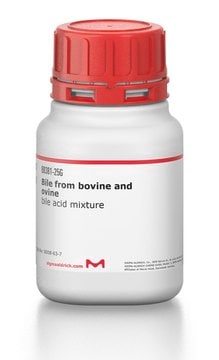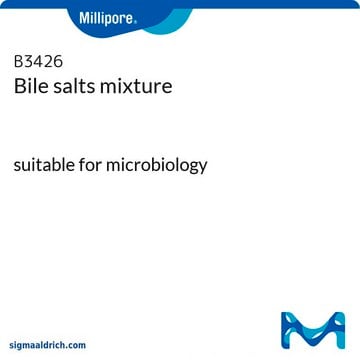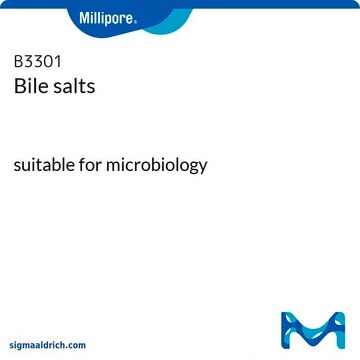B8756
Gallensalze
suitable for microbiology
Synonym(e):
Bile acids sodium salt, cholic acid-deoxycholic acid sodium salt mixture
Anmeldenzur Ansicht organisationsspezifischer und vertraglich vereinbarter Preise
Alle Fotos(1)
About This Item
UNSPSC-Code:
41106212
NACRES:
NA.85
Empfohlene Produkte
Sterilität
non-sterile
Qualitätsniveau
Form
powder
Löslichkeit
distilled water: freely soluble
Anwendung(en)
microbiology
Lagertemp.
10-30°C
Verwandte Kategorien
Allgemeine Beschreibung
Bile salt is an organic sodium salt with a conjugate of any of the bile acids along with either glycine or taurine. Biles salts are composed of four different kinds of bile acids - cholic, deoxycholic, chenodeoxycholic and lithocholic acids.Bile salts are extracted under controlled conditions from purified fresh bile, to be used in bacteriological culture media, where it behaves as a selective inhibitory agent that enables isolation and identification of pathogens. For example, in MacConkey Agar/Broth.
Anwendung
Bile salts may be used as one of the selective agents to prevent the growth of injured Escherichia coli cells, in an experiment done in order to identify the specific agent in the selective media which would inhibit the growth of the injured Escherichia coli ML30 cells. It may also be used for identification of isolates of Vibrio (Beneckea) vulnificus which is a halophilic bacterium, found responsible for causing several human infections.
Sonstige Hinweise
Gemisch aus Natriumcholat und Natriumdeoxycholat
Lagerklassenschlüssel
11 - Combustible Solids
WGK
WGK 3
Flammpunkt (°F)
Not applicable
Flammpunkt (°C)
Not applicable
Persönliche Schutzausrüstung
Eyeshields, Gloves, type N95 (US)
Choose from one of the most recent versions:
Analysenzertifikate (COA)
Lot/Batch Number
Don't see the Right Version?
If you require a particular version, you can look up a specific certificate by the Lot or Batch number.
Besitzen Sie dieses Produkt bereits?
In der Dokumentenbibliothek finden Sie die Dokumentation zu den Produkten, die Sie kürzlich erworben haben.
Kunden haben sich ebenfalls angesehen
Daniela Andrea Ramirez et al.
Food chemistry, 215, 493-500 (2016-08-21)
Organosulphur compounds (OSCs) present in garlic (Allium sativum L.) are responsible of several biological properties. Functional foods researches indicate the importance of quantifying these compounds in food matrices and biological fluids. For this purpose, this paper introduces a novel methodology
Christina S Faherty et al.
Molecular microbiology, 85(1), 107-121 (2012-05-11)
Shigella flexneri is a Gram-negative pathogen that invades the colonic epithelium. While invasion has been thoroughly investigated, it is unknown how Shigella first attaches to the epithelium. Previous literature suggests that Shigella utilizes adhesins that are induced by environmental signals
Lian-Hua Cui et al.
Journal of microbiology and biotechnology, 28(4), 510-519 (2018-02-01)
Synbiotics are a combination of probiotics and prebiotics, which lead to synergistic benefits in host welfare. Probiotics have been used as an alternative to antibiotics. Among the probiotics, Pediococcus acidilactici (PA) has shown excellent antimicrobial activity against Salmonella Gallinarum (SG)
Divya Eratte et al.
Food chemistry, 227, 129-136 (2017-03-10)
Solid co-microcapsules of omega-3 rich tuna oil and probiotic bacteria L. casei were produced using whey protein isolate-gum Arabic complex coacervate as wall material. The in-vitro digestibility of the co-microcapsules and microcapsules was studied in terms of survival of L.
Gordana Panic et al.
Parasites & vectors, 6, 237-237 (2013-08-15)
Echinostomiasis is one of the major food-borne trematodiases and the species Echinostoma caproni serves as a useful model for trematocidal drug discovery. The current in vitro drug sensitivity assay uses adult E. caproni worms that are incubated with candidate drugs
Unser Team von Wissenschaftlern verfügt über Erfahrung in allen Forschungsbereichen einschließlich Life Science, Materialwissenschaften, chemischer Synthese, Chromatographie, Analytik und vielen mehr..
Setzen Sie sich mit dem technischen Dienst in Verbindung.











